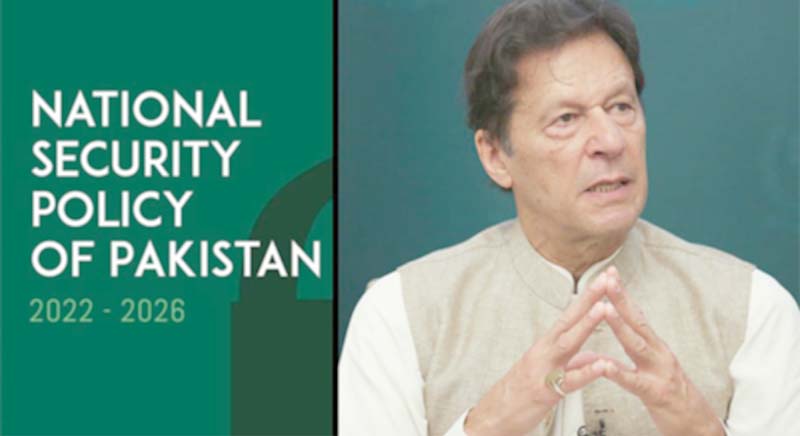By Mirza Kashif Baig
Pakistan’s National Security Policy, 2022-2026, emphasizes on economic security and while making it public, Prime Minister Imran Khan stated that a country without a stable economy cannot be considered secure. A distinctive feature of the NSP is that it distinguishes traditional security primarily defined in terms of defense, sovereignty, and diplomacy from non-traditional security, which takes a holistic approach and includes human security and the well-being of citizens.The document begins by stressing “unity in diversity” of religion, ethnicity, and socioeconomics, and then quickly moves to highlight “divisive discourse” amplified by “external forces” without specifying who they are. In the past, Foreign Minister Shah Mehmood Qureshi has been critical of Indian and Afghan spy agencies for creating trouble in Pakistan while National Security Advisor Dr. Moeed Yusuf has frequently highlighted a 15-year disinformation campaign targeting the European Union and the United Nations to serve Indian interests and spread fake news regarding Pakistan. It is likely that the “external forces” mentioned in the document are Pakistan’s neighbors. The NSP calls for fostering “patriotism and social cohesion through national values and ethnic, religious, cultural and linguistic diversity.” While the document doesn’t give details of the strategies but terms rights groups such as the Pashtun Tahaffuz Movement and nationalist political parties as “external forces” aiming to disrupt Pakistan. This is quite significant as these forces have never been declared as external elements despite the fact that they operate against the national interest of Pakistan, This shows that a significant line has been drawn. The NSP aims to drive national cohesion through education, cultural institutions, and inclusive national discourse.Underlining that the paradigmatic shift hinges on economic security through regional connectivity and shared prosperity, the policy looks to address the long-standing higher foreign exchange outflow over inflow through a “dedicate focus” on export-oriented foreign directive investments and remittances. The same section prioritizes “equitable economic development” to overcome socio-economic inequality through existing programs for the poor such as Ehsaas, a cash facility, and Panah Gah, which provides them with shelter homes. Lastly, it aims to remove disparities in economic development between various regions of the country. The NSP observes that current jobs may be obsolete in the next three decades and stresses the need for the creation of high-tech jobs and investment in start-ups and public-private partnerships. The NSP also proposes increasing the renewable energy pool by 30 percent in 2030 Economic interests once again take center stage while reintroducing regional connectivity to realign the country’s foreign policy. Prosperity is linked to the exploration of markets in Eurasia and the African continent with the aim to change Pakistan’s international image from a security-centric state to an economic leader. The document recognizes Pakistan’s support for Afghanistan as a potential gateway for economic connectivity with Central Asian states. With China, Pakistan hopes the China-Pakistan Economic Corridor will drive its economy to jump-start domestic growth and alleviate poverty. With the United States, interestingly, it insists Islamabad will not subscribe to “camp politics” yet seeks convergence in trade, investment, energy, security, and intelligence cooperation. Although the policy encourages better ties with India it also criticizes Narendra Modi’s disruptive policies. On Jammu and Kashmir, it insists on remaining “steadfast” in providing moral, diplomatic, political, and legal support to Kashmiris until they achieve the right to self-determination. It declares resolution of the Kashmir dispute to be a “vital national security interest.” The policy also prioritizes the need fro fencing along the Afghanistan-Pakistan border and improved defense at the Line of Control (LoC) with India. It lays emphasis on Pakistan’s developing its naval capabilities. It expands the tangible domains of national security to include the cyber realms by stressing the need for counter-propaganda against the country in the digital world. Terrorism is at the top of the list of issues relating to internal security. While the document acknowledges economic disparity as an important reason for militancy in conflict areas, it views sub-national groups as being aided by foreign intelligence agencies. The rise of violent religious extremism certainly poses a great risk to the country’s security, hence the policy promising “action against those producing and disseminating hate speech and material will be swift and uncompromising” comes in good faith.The NSP is impressive and addresses the need of the hour, what needs to be seen, however, is that it is implemented in its true spirit. All in all this seems like a great policy to address the issues faced by Pakistan and take progressive steps towards the future.


